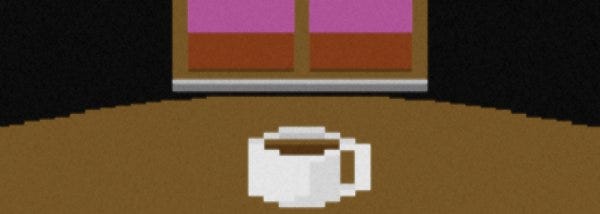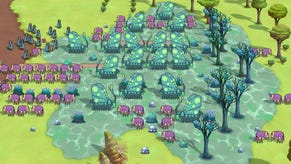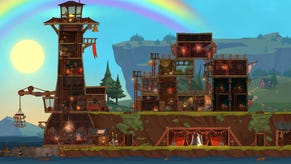IGF Factor 2010: A Slow Year
Ian Bogost's A Slow Year is "A chapbook of game poems for Atari VCS, PC, and Mac". As in, it's primarily developed for the VCS - being released in a limited edition cartridge - with the other two system being ports. It's picked up a nomination for the IGF Nuovo Award. It will inevitably drive some people mad by its mere existence. Good. Some people exist to be annoyed. Your annoyance is a barometer of whether culture is progressing or not. It's available later this year. Until then, we talk to its creator about A Slow Year...
RPS: Firstly, a brief intro to those who may not know you. Who are you? What's your background? Why get into games? Why get into indie games?
Ian Bogost: I'm a professor at the Georgia Institute of Technology, and I'm also the co-founder of a small studio called Persuasive Games. At Georgia Tech, I teach in the programs in computational media and digital media, and I do research on games. I've written three books on videogames, the last of which was Racing the Beam: The Atari Video Computer System (with Nick Montfort). Persuasive Games makes games about social and political issues, what some people call "serious games," although I don't use that term. We've made games about weird things like disaffected copy store workers, immigration legislation, and airport security.
So, I have a professional life researching, teaching, and making games, but there are other games I want to make that don't work in those contexts. A venue like the IGF offers a place to show a game that is just exactly what I wanted to make, and that's the only reason to call a work independent.
RPS: And... the game. Tell us about it. What was its origins? What are you trying to do with it? What are you most pleased about it? What nags?
Ian Bogost: A Slow Year is a set of four small games about attention and the experience of observing things. I wanted to explore the kind of condensation and compression one usually finds in poetry, particularly in Imagism, but also in those poets' inspirations in east Asian literary traditions, including the haiku. I've been calling them "game poems," and the four of them together form a little collection, like a chapbook.
Since I was after condensation and compression, I decided to make the game for the Atari VCS (aka the Atari 2600), which I've spent a lot of time researching about, teaching, and developing for. I should be clear here: this isn't a modern game made to look retro; I wrote it in 6502 assembly for the Atari hardware, and I'll release it on that hardware, as well as in PC/Mac form in a custom emulator.
True to both of these inspirations, each of the four games is limited to 1k in size (4k is a standard Atari ROM size), and each represents a season of the year. As games, they each offer a challenge about a familiar, banal idea: watching leaves fall or prolonging a morning cup of coffee, for example. They're all played in the first person, but in unfamiliar ways. One requires first-person coffee drinking. Another involves closing one's virtual eyes in the game. As poetry, they evoke rather than clarify. As images, they are visually evocative in spite of the apparent primitiveness of the Atari as a platform. I hope the game makes the Atari seem beautiful.
As for what pleases me most, I'm quite happy with the renditions of wind and rain I was able to accomplish in the autumn and spring games, respectively. The Atari is a strange and limited machine; it only has graphics registers for five moving objects, only two of which are "high" resolution, so getting a screen's worth of weather felt immensely gratifying. As for flaws, the biggest risk is whether or not I'll be able to make the game legible to players. Maybe I'm about to lose all my remaining credibility, it's not my intention to be effete or obscurantist. Yet, I know that's how some will receive the game. But, I really mean all this stuff. It's not pretense.
RPS: What's your feelings on the IGF this year. Pleased to be nominated? Have particular love, bemusement or hate for any of the other entries? Is there anything you think is missing?
Ian Bogost: I'm certainly both humbled and excited to be nominated. I've been nominated in the Nuovo category, which is both apt and ironic. It's apt because let's face it, this game is pretty far out there; I think in that respect it really embraces independence by refusing to apologize or self-justify. It's ironic, of course, because it's funny to think of a game for a 33 year-old game console representing what's "new" in games.
I haven't played all the other nominees in this and other categories, but I'm very much anticipating doing so at the show. I'm particularly looking forward to Cactus's Tuning, which I've heard great things about.
RPS: How do you feel about the indie scene generally this year? People have been relatively downbeat about 2009, after 2008 being so obviously incendiary. What are the themes, in your eyes? What are people missing?
Ian Bogost: The jury had a rough charge this year, just because there were so many entries of such very different styles and motivations. How do you compare Windosill with Super Meat Boy, or Don't Look Back with EnviroBear 2010? It's a good sign that we're starting to outgrow the very idea of a single, monolithic "indie scene." Instead, we have a wealth of different styles and forms and techniques emerging. I think that's the theme this year: a resistance to themes. A raggle-taggle assortment.
That said, if you ask me there is one person obviously missing from the IGF this year, and it's Terry Cavanagh.
RPS: And how does the future look for you? What are you working on now and the foreseeable future.
Ian Bogost: I just finished a new book on games and journalism with two of my grad students, called Newsgames, which will be published this summer. I've got three more books in progress, although one of them's a book of philosophy instead of a book of game criticism (don't worry, games will certainly make an appearance). At the studio, we're finishing up an game that I'd bill as half brain game and half exergame, but not in the way you'd expect. That'll be out this year, first on iPhone.
As for independent work, I have two games I'm looking forward to getting back to after IGF. One is a fairly traditional puzzle game with a twist, and the other is a game that involves both procedural character generation and a whole lot of computers to play effectively. Cryptic, for now, but there's still much to do.
Oh, and I'm teaching a class this term at Georgia Tech on the Atari, and I'm sure I'll continue doing that well into the future, as often as they let me do it!
RPS: Thanks for your time.












